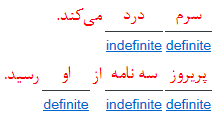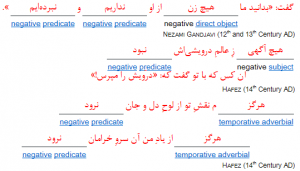The polarity grammatical category of a noun phrase indicates whether the noun phrase is an empty set or not. In other words, it expresses whether or not the speaker is convinced of the existence of any entities in this set.
| Contents |
|---|
a. Polarity’s Subcategories
The following subcategories of the polarity exist in Persian:
a•a. Affirmative Noun Phrases
An affirmative noun phrase refers to an entity whose existence the speaker is convinced of.
All definite noun phrases are affirmative, but indefinite noun phrases can also be affirmative:
a•b. Negative Noun Phrases
Noun phrases which refer to empty sets are negative and always indefinite. The negative polarity can be noted in Persian in the following cases:
- Inexistential determiner phrases, in a simple form or with the enclitical article /-i/ (see 7•۱۰•a.):
پریروز هیچ نامهای /hiʧ nɒme-i/ از او نرسید.
هیچ کس /hiʧ kæs/ را به خانه راه نده!
او به هیچ گروهی /hiʧ goruh-i/ وابسته نیست.
- Nominal inexistential pronouns (see 7•۱۰•b.):
پریروز هیچی از او نرسید.
- Every partitive genitive phrase is negative, if its nucleus is negative:
هیچ کجایِ دنیا خانهیِ آدم نمیشود.
- Other indefinite noun phrases can also be negative:
پریروز نامهای از او نرسید.
کسی را به خانه راه نده!
او به گروهی وابسته نیست.
کس ندانست که منزلگهِ مقصود کجاست
این قدر هست که بانـگِ جرسی میآید
Hafez (14th Century AD)
b. Concord and Discord in the Polarity
(See 3•۱•b. Concord and Discord in the Number and 3•۳•b. Concord and Discord in the Person.)
One feature of Persian language is the Verbal concord in the polarity: The predicate must become a negative verb phrase as soon an noun phrase in the sentence is negative, or the adverb /hærgez/ (/hærgiz/, /hægerz/) appears in that (as temporative adverbial):
On the other hand, two forms of verbal discord in the polarity exist in Persian:
- Verbal discord with affirmative predicates:
This constellation which is valid in most Indo-European languages is seldom noted in Persian literature (and probably only owing to metrical conformation, see 7•۱۰•b.):
مگر میرفت استادِ مهینه
خری میبرد، بارش آبگینه
یکی گفتش که: «بس آهستهکاری
بدین آهستگی بر خر چه داری؟»
«چه دارم؟» گفت: «دل پُرپیچ دارم
که گر خر میبیفتد هیچ دارم»
Attar Nishapuri (12th and 13th Century AD)
This discord should be distinguished of the case in which nominal inexistential pronouns and inexistential determiner phrases refer to negligibly small subsets for the exaggeration and are therefore affirmative:
و گر هیچ خویِ بد آرد پدید
به سانِ پدر سرش باید برید
Saadi (12th and 13th Century AD)
گر هیچ سخن گویم با تو زِ شکر خوشتر
سد کینه به دل گیری، سد اشک فرو باری
Manuchehri (10th and 11th Century AD)
این همه گفتیم، لیک اندر بسیچ
بی عنایاتِ خدا هیچیم، هیچ
Rumi (13th Century AD)
مرا در شعر گویی هیچ کس داشت
پس آن گه هیچ کس را داد هیچی
Suzani Samarqandi (12th Century AD)
(/hiʧ kæs/ هیچ کس in the last verse is even definite!)
- Verbal discord with negative predicates:
This constellation occurs only if the sentence includes no indefinite noun phrases:
درویش را نباشد برگِ سرایِ سلطان
ماییم و کهنهدلقی کهآتش در آن توان زد
Hafez (14th Century AD)
دل بنهند بر کَنی، توبه کنند بشکنی
این همه خود تو میکُنی، بی تو به سر نمیشود
Rumi (13th Century AD)



